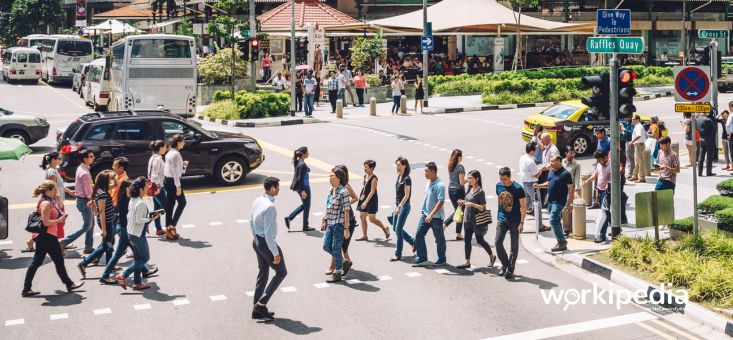It has been a decent decade for middle-income workers in Singapore, according to the Monetary Authority of Singapore (MAS).
“Broad-middle” workers refer to local resident workers in the 21st to 80th income percentiles of their age cohort. According to its October 2023 report, these workers had a 42% increase in nominal income (meaning it’s not adjusted for inflation) between 2011 and 2021. In comparison, earners in the lower and higher brackets had a 36% rise in wages.
According to MAS’s 2021 definition, these are some characteristics of middle-income bracket workers:
- Half are between 25-45 years old
- Two-thirds stay in 4- and 5-room flats
- 60% are married, and 54% have at least one child
- One-third have a degree, whilst 20% have a diploma
- 62% are PMETs (Professionals, Managers, Executives and Technicians) and 38% non-PMETs, followed by 10% each for manufacturing, wholesales, admin and support.
Employer size, productivity, and upskilling and reskilling mattered
The report also revealed that moving to larger and more productive firms improved the income prospects for middle-income workers who made the shift, with their incomes doubling over the same time frame.
In comparison, workers who stayed in less productive or smaller firms, had more modest income growth of about 50%.
It was also observed that middle-income workers who reskilled, upskilled, or pursued further education saw a bigger increase in average income compared to those who didn’t.
Betul Genc, the senior vice-president and head of ASEAN for human resource solutions and consulting company Adecco, believes that the growth in salary for middle-income workers can be attributed to multiple factors.
She said to Workipedia by MyCareersFuture: “With strong support from the Singapore Government on upskilling and reskilling, and increased focus on education and skills to ensure a future-ready workforce, salaries would have been adjusted to match accordingly.
“Additionally, the Singapore Government conducts periodic salary reviews and minimum salary adjustments for identified industries, roles and employment/work passes, which positively impacts lower-income workers, creates competition for high-skilled roles and, in turn, drives middle-income salaries upwards. “
Will this salary momentum continue for broad-middle workers?
For “broad-middle” workers, the outlook may not look that encouraging at first glance. Singapore’s economic growth is slowing down to 3.7% from 5.7% in the decade before, due to low birthrates and an ageing population taking its toll on the economy. The job market is also shifting thanks to technology and geopolitical shifts.
Predicting the trajectory of salary growth, overall income trends or hiring sentiments for 2024 is a complex task as numerous factors can exert their influence on the outcome, Betul believes.
“These variables might include one or more of the following – state of the global and local economies, the potential impact of recessions or economic instability, the effects of inflation on real salaries which leads to increased living costs, government policies, the commitment of workers to continuous development, the specific role and industry in which individuals are presently employed, and the market dynamics or organisational goals, amongst others.”
Looking for a new role? Explore over 100,000 jobs available on MyCareersFuture now!
Reskilling and upskilling are key factors for the broad middle
But it’s not all bad news. MAS believes that Singaporean workers can still jump on the tech bandwagon, as these changes could still have job-boosting effects, provided workers are equipped with the right skills to take on the new roles created.
“The income growth of the broad middle depends on the corporate sector’s ability to take advantage of technology and scale in a dynamic economy, and tripartite effort to reskill and upskill workers to enable them to take on more productive and well-paying jobs.”
Betul added: “As Singapore transitions into the next phase of its economic growth, middle- and upper-income workers will need to refresh their skills to remain competitive and relevant.”
“Some skills that would be in demand include data analysis and data science, which is increasingly utilised across sectors and roles, digital competency as technology continues to transform industries, as well as green skills which would open up job opportunities.”
“The World Economic Forum found that cognitive skills such as analytical thinking, creative thinking and adaptability are increasingly in demand.”
“Other skills which are non-replaceable by technology include communication and soft skills which provide workers with an edge over others with the same technical skills.”
“However, it is also important to identify industry or role-specific trends and training that aligns with one’s career goals and the changing demands of the job market.”
Keeping wage expectations realistic matters
But those wanting faster pay growth should temper their expectations. The MAS is projecting that, in the quarters ahead, the pace of increase in overall remuneration (including bonuses) should moderate in line with the decline in nominal GDP growth this year, after the strong increases in the preceding two years.
This is likely to stem from lower bonus payments in 2024. More moderate wage gains in the near term were also corroborated by MOM’s recent survey, showing that the proportion of firms with intentions to raise wages in the next three months fell from 28% to 18%.
As it stands, the compensation of Singapore workers is currently close to pre-pandemic (2015–19 average) levels, which MAS believes indicates that there is no overall underlying pressure in the economy for wages to catch up with recent increases.
Of course, this also differs from industry to industry. Wage increments and hiring could remain relatively firm in sectors that continue to see a recovery in the post-pandemic era, such as the travel-related industries, underpinned by substantially higher Chinese visitor arrivals.
In the labour-intensive services sectors (e.g., administrative & support services, retail trade, F&B services), hiring and salaries are already elevated relative to pre-pandemic levels, and employers may seek to enhance labour efficiency over time to restore profitability.
Overall, while the pickup in the Singapore economy shows indicators of strength and sustainability, uncertainties in 2024 could weigh future projections down, such as a broadening of the Israel-Hamas conflict, according to the MAS report.
But in the absence of any renewed shocks or setbacks in the global economy, the Singapore economy should benefit as the global tech industry gradually recovers and global interest rates level off over 2024, it concludes.














